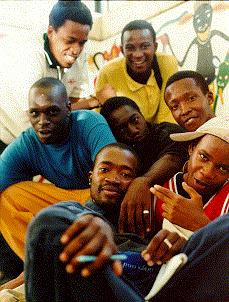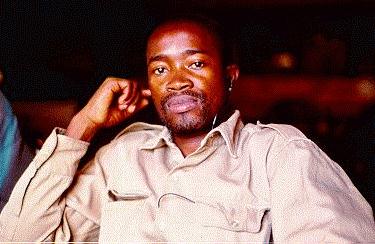
KU minus Fresh-G and Y-Tang

Kwanza Unit, or for short KU, means "First Unit" and it was formed in 1993 by a merger
of several groups such as Villain Gangsters headed by rap veteran Rhymson
(alias Ramadhan A. Mponjika), Riders Posse, Tribe X and some solo artists.
Rhymeson remembers when rap started in Tanzania in the 1980s:
People were just rhyming without radio support, it was hectic
back then. You could feel the energy. Sometimes in a picnic or
party at the beach MC:s grab the mike and battling. The battle
was so hard sometimes that it became physical.
We used to rhyme on other peoples beats and many MC:s at that
time used to copy other people's songs. We had home made dubs of
other peoples beats.
- - - -
In the old days we were just copying. Now we are also doing it our
own way. When we first started we used to rap in English. My first
Kiswahili rap I heard in Nairobi in 1991. I went to Nairobi to a
competition called Revolution Rap Competition. I saw a crew from
Mombasa called B.M.W. That's the first time I heard Kiswahili
rhyme.
- - - -
When we started in Kiswahili it was more like experimental,
experimenting if we could rhyme in Kiswahili. More like a
fusion. We have listened to English so much that we know what
the people talk when they rhyme in English, on their own life
in their society. But it is many rappers here that are rhyming
without knowing what they should write in their rhymes.
They mix it with other ideas. They don't know deep what rap is all about.
Kiswahili is well suited to rap. It uses so much vowels. You
can write rhymes easily, more easy than in English. If Tanzania was
like South Africa, a country that could expose itself to the outside world,
I think Kiswahili would be all over Africa.
Today Kwanza Unit consists of Rhymson, KBC (Kiba Cha Singo), D-Rob (Robert Mwingita), Eazy-B (Bernard Luanda), Bugzy Malone (Edward Margat), Papa Sav (Makanga Lugoe), Abbas Maunda, Fresh-G and Y-Tang. There is also a wider circle of affiliated members referred to as Kwanza Unit Foundation or Kwanzonians.

KU has published two cassette "albums" and were recording the third when we met them. Since Rhymson works at a TV station they have had the possibility to record seven videos, but only four of them had been broadcasted. They also occasionally perform live, but they really want to perform more regularly.
A big difficulty is that the society at large thinks that rap is for
hooligans. This also makes it hard to get airplay. The media wants positive
messages.
The thing that is positive to me may not necessarily be positive
to you. If the police mistreated me I could curse to ease my
tension after having been disturbed by a policeman. If I say that
in rhyme, in a poetic way, not necessarily the radio announcer
should say this is positive or not. They can always say it's
negative to their opinion, cause everybody has a right to their
own opinion. In hip hop I can express my views by giving you a
challange, so you come to me the next day and say: What do you
mean when you say that?
But KU certainly make their mark in Dar.
I feel good when I walk in the street and hear this little kid passing
singing my song.
Samples of Kwanza Unit (cassette from Bongo Records):
The second sample is at the start of the tune. Rhymson comments:
The short story before the song is like "You are coming
to break the door and steal the lyrical manuscripts, we're scared
of you, you are so smart so we have to be very careful." Before
they do anything the thunderstorm came, BOOM, and the dog started
to bark. The message behind is that we have so many kids out
there trying to steal our style but they can't. They can copy
the lyrics, but not the style. If we release a song and you a
month later go to a concert or listen to the radio you hear the
same lyrics. They're biting.
"Biting" means stealing. The sound of the dog also suggests potential biting.
|
TO THE SCENE IN DAR |
|---|
 |
|---|